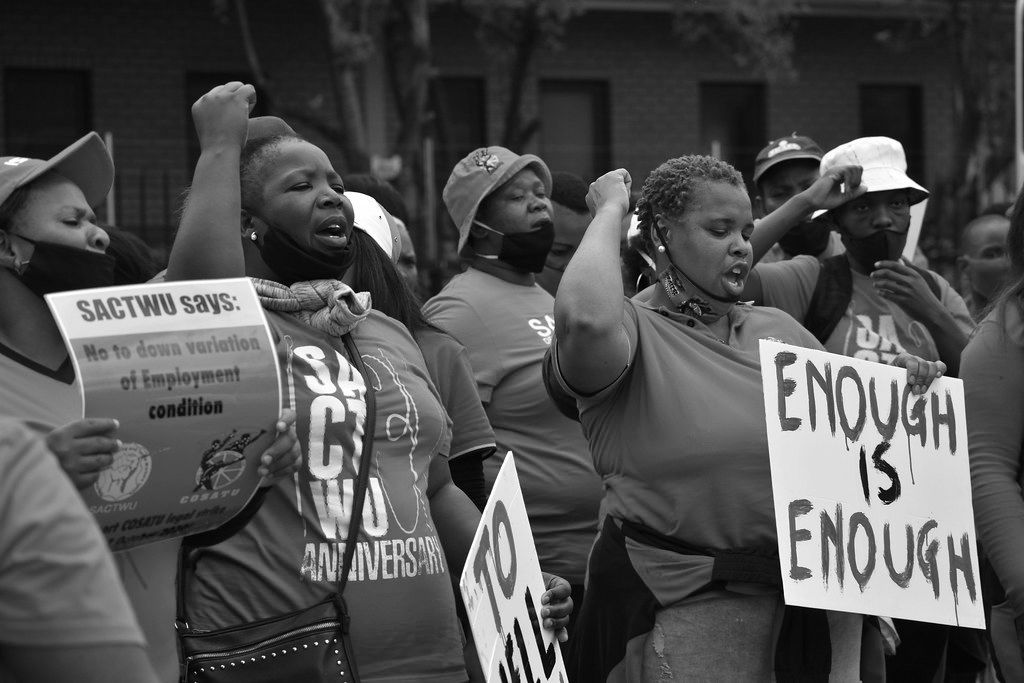Written by Mametlwe Sebei & Ndumiso Ncube
Class rule benefits from oppression as it is essential for the economic and colonial exploitation by a tiny elite. Oppression of women and LGBTQI+ people are among the oldest forms of oppression, integrated into the system of capitalist oppression today.
Previously, women were denied access to education and most economic activity. Although some barriers of entry to the workplace have now been removed, women still suffer abuses at work.
In addition to gender based violence (GBV), women suffer more nuanced forms of oppression. Women workers often carry the burden of household chores on top of the pressures of their jobs. Working class women carry out several key functions in society, from raising and educating children to being drivers of the economy.
Unions have not been exemplary in their approach to women’s struggles. For example, SAFTU appointed Douglas Mthukwane in an extreme case of a common insensitivity towards women in the workers’ movement. Although he was rightly dismissed, SAFTU leadership failed to conduct background checks initially that revealed convictions of GBV, and several charges against him, including serious accusations of rape. With high levels of GBV and widespread sexist views on women and LGBTQI+ people in SA, a thorough check of police, news and social media records should be a minimum step in such appointments.
Cosatu’s appointment of Zingiswa Losi as its first woman president was hailed as a progressive step. Under her stewardship however, Cosatu has proven that placing women in leadership positions without having a revolutionary political foundation is not the solution. Led by Losi, Cosatu has not fared better on this issue. It remains tied to the ruling party, whose capitalist policies have been catastrophic for women – evident in shocking levels of GBV, wage inequality and the disproportionate impacts of job losses on women.
Trade Unions must provide platforms for women to organise, take forward the struggle for gender equality in the workplace as well as in society as a whole, and actively educate their members for this. Women’s caucuses and working groups are vital. SAFTU’s decision to launch a National Gender Commission is an important step. WASP fully supports the development of such structures across SAFTU and works for them to develop a thorough socialist feminist programme. They must link with those of Cosatu, women’s groups in mining-affected communities, townships, and rural areas, and with struggles in communities, campuses and other arenas to build a mass working class movement for an end to gender oppression.
The Gender Commission should urgently discuss and adopt workplace demands such as free childcare, parental leave and the ending of sexual harassment. There are different experiences of oppression under capitalism, but it is important to underline the class nature of society as the root cause of oppression. The working class, as the only force with the power to overthrow capitalism, can lead the struggle to end gender oppression in all its forms.
We must demand that the struggle against gender inequality occupies its rightful place on the working class agenda. The explosive development of the women’s movement across the world and SA will force the workers movement to do so. We already saw this in the nine-day underground sit-in by Lanxess mineworkers, NUPSAW’s occupation against sexual harassment in workplaces, and the Oct 7 Cosatu Strike demands around GBV and equal pay. The Gender Commission must develop a programme to match and take forward these beginnings, and to place the workers movement at the forefront of the struggles for gender equality.





